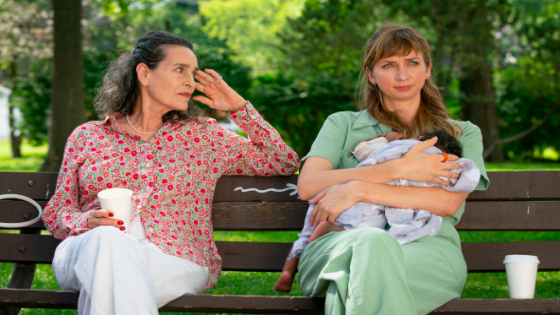Indie film shoots are filled with challenges, but writer-director Nora Fiffer was determined to make the set of her debut feature film, “Another Happy Day,” as family-friendly as possible.
After all, she wrote the comedic drama about postpartum depression and the challenges that come with becoming a parent. In the film, now on VOD from Gravitas Ventures, a new mom (Lauren Lapkus) navigates many of those complex emotions: Feelings of isolation, not connecting with friends in the same way, a partner that doesn’t understand her exact needs, how relationships with work and creativity change, the exhaustion that goes deeper than simply being tired. Even though these are universal feelings for millions of women, they’re rarely shown in such a raw and unflinching way on screen, which is why Fiffer felt she needed to make the film.
“I was absolutely blindsided by not only the workload of motherhood, which is the best-kept secret, but the identity shift as well,” she says. “I had no idea how much I would change internally, and how the perception of me would change by becoming a mother. So it took a while to figure out who I was, and because I hadn’t seen any representations of new motherhood on screen, it was such a vivid time for me.”
Lapkus, a mother of two herself, was initially drawn to the project before she had children, but once she became a mother it became even more important for her to be a part of the story.
“We had been talking about this movie for years,” she says. “When Nora first sent it to me, I had not had children yet, and I loved the script. It spoke to me even then, but I look back and I’m so grateful that it actually took as much time as it did to get this movie made because when I had a kid, I was like, ‘Oh, I relate to this in a totally different way.’ It was so helpful for me as an actor to have real experiences to draw from. This movie really makes me cry, just removing myself from the equation. It’s such an important subject.”
In the spirit of supporting mothers around her while making her art, Fiffer wanted to make the set more comfortable for families by making the shooting days run 9-5 and having childcare available. Fiffer thinks it’s possible for any Hollywood production to follow suit and put parents’ needs first.
“It really is a matter of priority,” she says. “I think to say that something is a priority … The only way to really mean it is to write it into the budget, because then you say, ‘Hey, this is so important that we have this line item here and it means that we can’t afford this over here.’
“We prioritize all kinds of things in a budget,” she continues. “‘Oh, we want a gorgeous set. Oh, it’s period costumes. It’s the CGI we need.’ If it’s childcare, then it’s childcare. If it’s eight-hour days, it’s eight-hour days. What that meant for us — because this is an independent film and there wasn’t an endless supply of financing — It was a set of priorities. If we can build it into the budget, that’s that’s how we make the change.”
Lapkus says she had never worked on a set that was so welcoming to parents.
“What Nora did by prioritizing eight hour work days for us as a crew was amazing,” she says. “This was a movie that was unlike anything I’ve ever done, and it was so nice. My baby was one when we shot this movie, and to be able to say goodbye in the morning and see her in the evening made it feel like I was just having fun for eight hours. You’re able to go and give yourself up to the project and not feel like you’re being drained — ‘Oh my God, I can’t ever get a break.’ It felt like Nora made this movie so doable for everyone.”
The accessibility didn’t stop there, as lead producer Jessie Holder Tourtellotte also had a baby and was pumping on set. Ultimately, Fiffer believes that moving away from the churn that leads to long stretches of 12-hour-plus days can still produce great films, and makes the industry more appealing to parents who have a lot to contribute.
“The hope was to support everyone, whether people have parenting responsibilities, other caregiving responsibilities, or just want a healthy work-life balance to make the workplace accessible,” she says. “That grind by the system is inaccessible to parents, and of course in society, it does typically fall to the mother. To change the system would be the ultimate goal, so that you send a message to people that this is an environment where we want parents to work, we feel like parents have a lot to give. I feel like I was a pretty productive person before becoming a parent, but my goodness, since becoming a parent, what I can do in an hour is quite remarkable. The pressure and preciousness of time for parents is a real asset.”
Watch the trailer for “Another Happy Day” below.
Source Agencies


